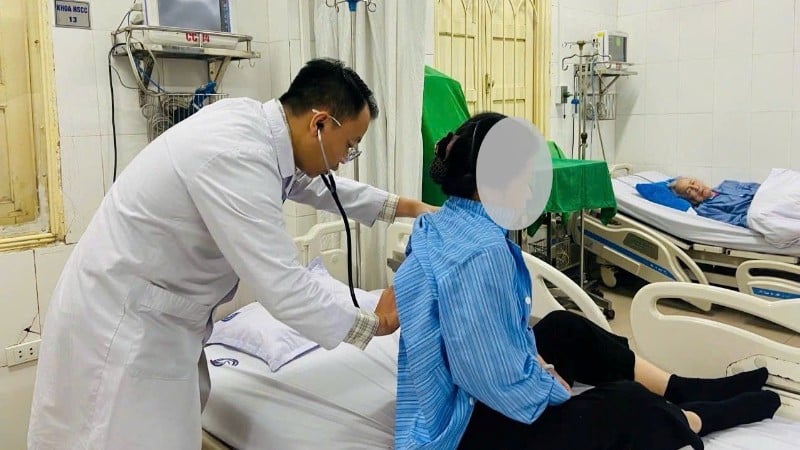
Two months after quitting smoking, the patient suddenly had chest pain.
The Emergency Department - Central Endocrinology Hospital has just admitted patient TTA, 30 years old, from Bac Ninh , admitted with chest pain, anxiety, and prolonged palpitations.
Patient A. has a history of Basedow's disease (an autoimmune disease of the thyroid gland) and has been treated at the Central Endocrinology Hospital for 2 years now. However, recently, the patient stopped taking medication for 2 months. Early in the morning of the day of admission (October 13), the patient suddenly had left chest pain radiating to the back, accompanied by a feeling of anxiety and palpitations, lasting more than 30 minutes.
Doctors said that at the time of admission, patient A. was alert, responsive, pulse 121 times/minute, blood pressure 120/70 mmHg, SpO₂ 96%, body temperature 37°C. The thyroid gland was diffusely enlarged grade Ib, soft, with no murmur.
Electrocardiogram results showed sinus tachycardia, with signs suggestive of myocardial injury. Echocardiogram showed preserved systolic function (EF 63%), no regional wall motion abnormalities, and no pericardial effusion.
Based on clinical and paraclinical signs, the patient was diagnosed with myocarditis and Graves' disease. Immediately, the patient was given emergency treatment, cardiovascular stabilization, pain relief, continuous monitoring via monitor, antithyroid drugs, acid secretion inhibitors and was transferred to a specialized cardiovascular hospital. Currently, the patient's condition is stable.
Cardiovascular complications of Basedow's disease are extremely dangerous.
According to endocrinologists, thyroid disease is a general term for hormone disorders caused by the thyroid gland producing too much or too little. When hormones are not secreted enough to maintain the body's normal metabolic rate, it leads to hypothyroidism. Conversely, when too much hormone is produced, the metabolic rate increases abnormally, leading to hyperthyroidism. Some other diseases may not be related to the thyroid's hormone production process, such as goiter (goiter) and thyroid cancer.
The disease can affect anyone. In particular, the rate of thyroid disease in women is 5-8 times higher than that in men.
In addition, other risk factors include: Family history of thyroid disease; diseases such as pernicious anemia, type 1 diabetes, primary adrenal insufficiency, rheumatoid arthritis, Turner syndrome; use of drugs containing a lot of iodine (amiodarone); people over 60 years old, especially women; previous treatment for thyroid disease or cancer.
In the case of patient A., according to the recommendations of doctors from the Emergency Department - Central Endocrinology Hospital, Basedow's is a common endocrine disease. However, if the patient does not comply with treatment, arbitrarily stops taking medication or takes medication irregularly, the patient is at risk of facing serious cardiovascular complications, including: myocarditis, heart failure, life-threatening arrhythmia.
The case of TTA is a warning about the importance of regular monitoring and proper treatment. Basedow's disease patients need to follow the doctor's instructions, not stop taking medication on their own even if they feel the symptoms have improved and should immediately go to an endocrinology clinic if they have unusual symptoms such as chest pain, anxiety, fatigue, weight loss, hand tremors or heart rhythm disturbances.
Source: https://nhandan.vn/bien-chung-viem-co-tim-do-bo-thuoc-dieu-tri-tuyen-giap-post921568.html




























![[Photo] "Ship graveyard" on Xuan Dai Bay](https://vphoto.vietnam.vn/thumb/1200x675/vietnam/resource/IMAGE/2025/11/08/1762577162805_ndo_br_tb5-jpg.webp)


![[Video] Hue Monuments reopen to welcome visitors](https://vphoto.vietnam.vn/thumb/402x226/vietnam/resource/IMAGE/2025/11/05/1762301089171_dung01-05-43-09still013-jpg.webp)








































































Comment (0)